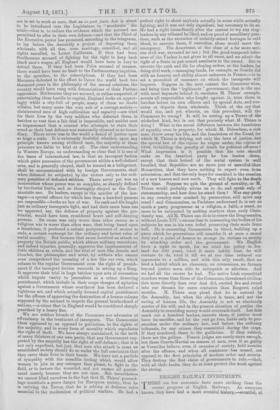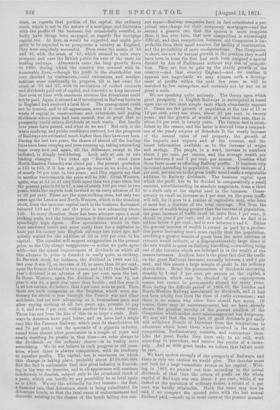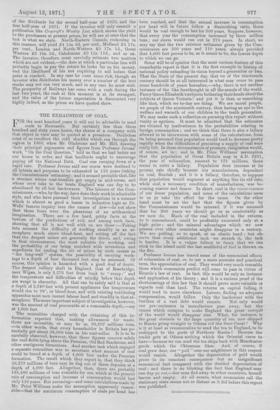ENGLISH RAILWAY INVESTMENTS.
rrHERE are few economic facts more striking than the recent progress of English Railways. As everyone knows, they have had a most eventful history,—eventful, at
least, as regards that portion of the capital, the ordinary stock, which is not in the nature of a mortgage, and fluctuates with the profits of the business, but occasionally eventful, so badly have things been managed, as regards the mortgage capital too. At first, as would be expected, and ought pro- perly to be expected in so prosperous a country as England, they were singularly successful. Then came the mania of '45 and '46, with the crash of '47, which seemed to ruin every prospect, and cure the British public for ever of the taste for making railways. Afterwards came the long growth down to 1866, during which the country was covered with in- numerable lines,—though the profit to the shareholder was ever checked by contractors,—and extensions, and amalga- mations were continually in progress, till at last came the crash of '66 and '67, with its revelations of cooked accounts and dividends paid out of capital, and discredit so deep incurred that even on lines with enormous revenue the debentures could not be paid. Again, it seemed as if investment in Rail way business in England had received a fatal blow. The management could not be trusted, and to all appearance, even if it could be, the waste of capital in constructions and extensions, and paying dividends where none had been earned, was so great that no prosperity could return dividends on such waste. But hardly four years have passed, and what do we see ? Not only is the waste made up, and public confidence restored, but the prospects of Railways are estimated much higher than they have ever been. During the last two years, the shares of almost all the leading lines have been creeping and even running up, taking astounding leaps every now and again, till the difference, except to the initiated, is simply bewildering. Look only at one or two leading changes. Two years ago "Berwick " stock (now North-Eastern Consols) was about par ; the present quotation is 165 to 166, if it has not gone up more as we write, a rise of nearly 70 per cent, in two years ; and City experts say that in another twelvemonth the price will be 200. Great Western, again, was at 44 to 47 very little more than two years since, but the present price is 96 to 97, a rise of nearly 100 per cent. in two years, while the experts look forward to an early advance of 25 or 30 per cent. These are the most striking cases, but only two years ago the London and North-Western, which is the steadiest stock, from the immense capital sunk in the business, fluctuated betweed 110 and 120, and the price is now advancing above 140. In every direction there has been advance upon a most striking scale, and the future increase is discounted at a corre- spondingly high figure. Pew speculations would in fact have answered better and more easily than for a capitalist to have put his money into English railways two years ago, and
quietly waited for the addition of 50 or 100 per cent, to his capital. The outsider will suspect exaggeration in the present price, as the City always exaggerates—a notion we quite agree with—but the actual improvement of dividends on which all this advance in price is founded is really quite as striking. In Berwick stock, for instance, the dividend in 1808 was last year it was 7i, an increase of 21., or more than 50 per cent., upon the former dividend in two years; and in 1871 the first half- year's dividend is an advance of one per cent. upon the last. In Great Western, again, the dividend in 1868 was ltle last year it was 3a, a good deal more than double ; and this year it is all but certain, we believe, that 5 per cent, is to be paid. Then there are such companies as the Brighton, which were sta- tionary for about a year through the French war and other accidents, but are now advancing at a tremendous pace, and after paying nothing at all two years ago, promise to pay 3, 4, and even 5 per cent. within another two or three years. There has not been the like of this on so large a scale. Rail- ways in America have paid better, and we have had a single case like the Panama Railway, which paid its shareholders 60 and 70 per cent. ; but the spectacle of a gigantic industry, raised from almost utter prostration in a couple of years and nearly doubling its profits in that time—we refer always to the dividends on the ordinary shares—is in reality more astonishing. We do not believe in such progress in old coun- tries, where there is always competition, with its tendency to equalize profits. The capital, too, is enormous on which this change is taking place, probably about £120,000,000. But the fact is undeniable that this great industry is flourish- ing in the way we describe, and to all appearance will continue indefinitely to flourish, subject only to the occasional check of a panic, which can hardly by any possibility be so fatal again as in 1866. We say this advisedly for two reasons ; the first, a financial one, that debenture stock is being substituted for debenture bonds, so that the fatal cause of embarrassment and discredit existing in the chance of the bonds falling due can- not recur—Railway companies have in fact substituted a per- petual rent-charge for their temporary mortgages—and the second a general one, that the system is more complete than it has ever been, that new competition is exceedingly difficult, and that competition between old Companies is im- probable from their small number, the facility of combination, and the probability of more amalgamations. The Companies, in short, are now by natural growth in the position they would have been in from the first had each been assigned a special district by Act of Parliament without any risk of competi- tion. They are free to gain by the steady growth of the country—and that country England—and we confess it appears not improbable we may witness such a develop- ment of profits within the next few years as will be matched by few enterprises, and certainly not by any on 80 great a scale.
We are speaking quite seriously. The theory upon which great prosperity in English Railways is anticipated is based upon one or two most simple facts which abundantly support it. These are the growth of population at the rate of 11 or 12 per cent. every ten years, about 25 per cent, in twenty years ; and the growth of wealth at twice that rate, that is, about 50 per cent. in twenty years. The former fact is estab- lished by the census, and the latter is derived from a compari- son of the yearly returns of Schedule D, the steady increase of the annual value of real property, the growth of the imports and exports and of the revenue, and the looser information available as to the increase of wages and savings. The people, in a word, increase in numbers about 1 per cent. per annum, and the average wealth per head between 2 and 3 per cent, per annum. Consider what these facts mean as affecting Railway profits. If business only increased according to population, even a steady increase of 1 per cent, per annum to the gross traffic would make a respectable addition to Railway dividends. The business capital upon which the profit has to be divided is comparatively a small amount, notwithstanding its absolute magnitude, from a third to a sixth only of the capital used in the business. Conse- quently so small an increase as 1 per cent. on the gross traffic will tell, for it goes to a residue of capitalists only, who have at most but a fraction of the total earnings. But from the increase of wealth being greater than the increase of population, the gross increase of traffic must be more than 1 per cent., it should be over 2 per cent., and in point of .fact we find it is seldom below 4 per cent., and is now between 5 and 6, Either the general increase of wealth is earned in part by a produc- tive power increasing much more rapidly than the population, involving a greater transit of goods than the mere increase of revenue would indicate, or a disproportionately large share of the new wealth is spent on Railway travelling,—travolling being one of the luxuries which are indulged in as the wealth of the masses increases. Anyhow, here is the great fact that the traffic on the great Railways increases annually between 1 and 6 per cent., and this means a large margin of profit to the ordinary shareholder. Hence the phenomenon of dividends increasing steadily by 1 and 2 per cent, per annum on the capital, a
phenomenon which may be checked by an unprosperous season, but cannot be permanently altered for many years.
Even during the difficult period of 1866-69, the London and North-Western Railway maintained its dividends, and it had not been wholly free from the vices of costly extensions ; and
there is no reason why other lines should fare worse. Of
course, there may be mismanagement, but we have already shown the peculiar novelty of the present position of the Companies, which makes mere mismanagement less dangerous. We may add that the very fact of good dividends got easily will withdraw Boards of Directors from the temptations to adventure which beset them when involved in the maze of competition, Parliamentary contests, and contractors' lines. Like the great Banks, they have only to sit still, work according to precedent, and receive the profits of a mono- poly. And as with great banks, we believe that failure must be rare.
We have spoken strongly of the prospects of Railways, and there is only one caution we would give. The investor must not look for a large immediate return on his capital. Writ- ing in 1869, we pointed out that according to the actual dividends of that time the return of profit on the whole capital of Railways was only about 4 per cent., while, if we looked at the quotation of ordinary glares, a return of 5 per cent, was hardly obtainable. Much the same may now be said, if we compare the quoted price with the last annual dividend paid,—made up in most cases at the present moment of the dividends for the second half-year of 1870, and the first half-year of 1871. If the investor will only consult a publication like Cracrogs Weekly List, which shows the yield to the purchasers at present prices, he will see at once that the fact is what we state. North-Eastern Consols, reckoning in this manner, will yield £4 lbs. 6d. per cent., Midland £4 17s, per cent., London and. North-Western £5 17s. id., Great Western £3 10s. 3d., Caledonian £3 15s. 11d., and so on. The investor, therefore, must carefully estimate two matters which are not evident,—the date at which a particular line will probably begin to pay the return he looks for on his money, and the likelihood of his not requiring to sell before that point is reached. In any case he runs some risk, though an investor who distributes his money over a number of the best stocks may not run very much, and in any case he must wait. The prosperity of Railways has come with a rush during the last two years, the rush at this moment is at its strongest, and the value of the future expectation is discounted very highly indeed, as the prices we have quoted show.
































 Previous page
Previous page